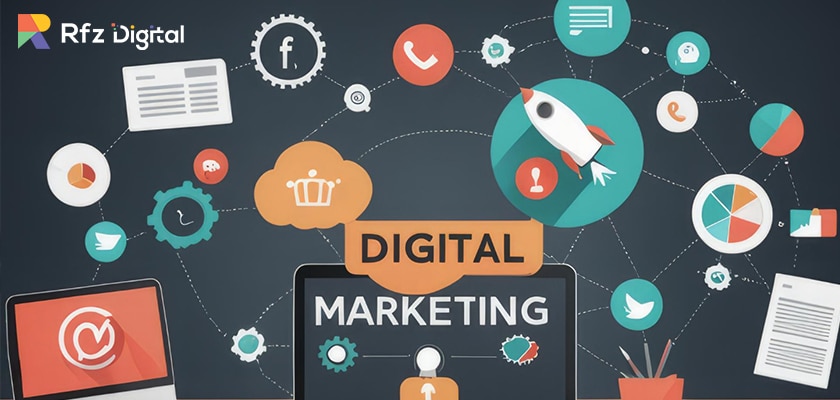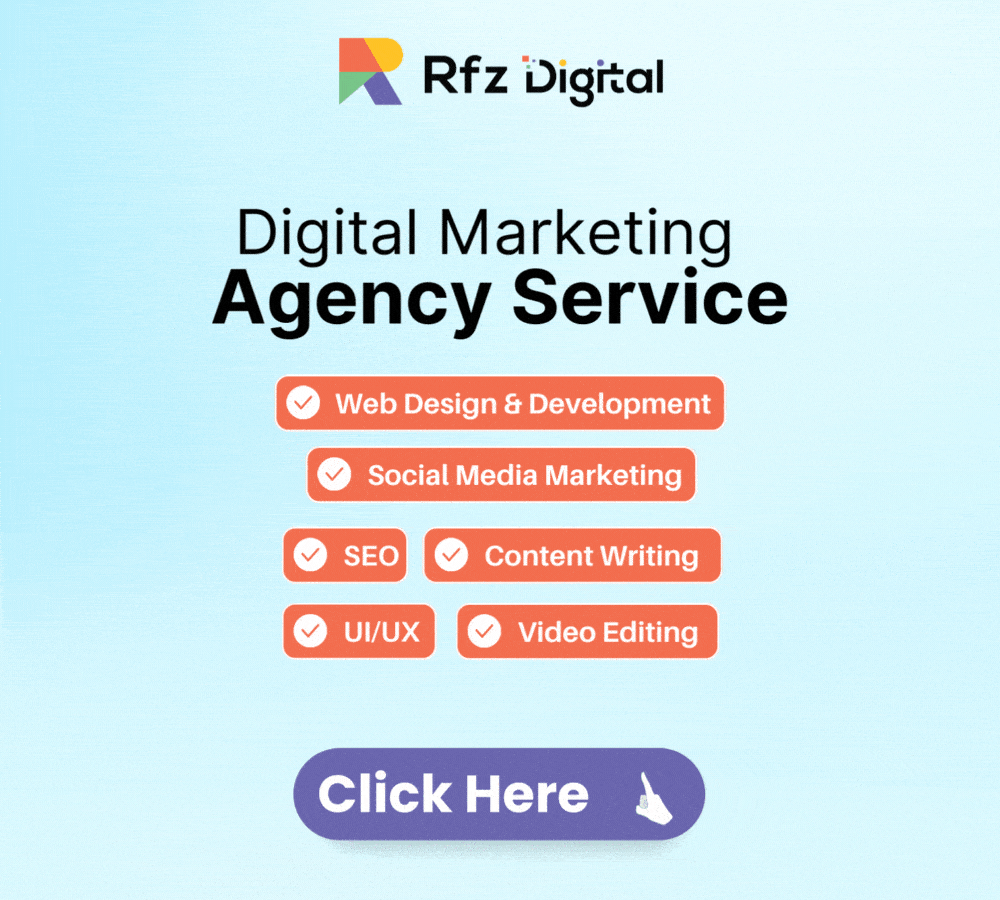Marketing has long been a key to business success, traditionally focusing on connecting the right customers to brands through various strategies. These methods have evolved over decades, playing an important role in generating leads and increasing profits. However, in recent years, digital marketing has emerged as a game-changer.
In our current digital era, having a strong online presence is important for the success of any business or brand, despite its size. Digital marketing, with its broad impact, is now a foundation for businesses ranging from growing start-ups to established multinational corporations. This guide will break down the basics of digital marketing, explaining what it is, why a digital marketing strategy is important, its benefits, and the different strategies and techniques professionals use.

What is Digital Marketing?
Marketing has always been about connecting customers with the right brand, a practice that has evolved over decades to generate leads and profits. Today’s digital age has introduced a newer concept, digital marketing, which is crucial for any business, from small startups to large corporations, to succeed.
An online presence in today’s world is essential for reaching and engaging with a higher number of potential customers. Digital marketing, a successful strategy in its own right, involves the creation. And dissemination of content across various digital media channels such as websites, landing pages, social media, email, and mobile applications.
This strategy includes the promotion of products and services using a variety of techniques, from paid, earned, and owned media to SEO, SEM, pay-per-click (PPC) advertising, and content syndication. These methods help attract customers through popular channels like mobile phones, search engines, and videos. Digital marketing helps businesses reach a larger audience than traditional methods could, enabling them to target specific demographics effectively.
Importance of Digital Marketing
Digital marketing strategies provide marketers with a clear set of goals and a target audience, forming the backbone of any digital marketing plan. This plan gives direction to every campaign or program, creating a framework for executing and evaluating outcomes. Digital marketing has become an integrated aspect of business in a rapidly changing world. Where companies must communicate and deliver value to customers through various channels.
To implement these strategies, businesses increasingly grow their presence in the global online marketplace, a necessity to compete in today’s environment. Over the years, digital marketing has evolved, offering opportunities that surpass traditional marketing methods like print ads and TV commercials. In the present world, where people spend more time on the internet, having an online presence is key to reaching potential customers. Approximately 5.07 billion internet users exist worldwide, equivalent to 63.5% of the world’s total population. And making digital marketing the preferred method to connect with audiences.
Benefits of Digital Marketing
Digital marketing tactics open direct communication between companies and customers, enhancing the customer experience along their unique buying journeys. Innovative marketers are now experts at delivering the right content at the right time through various channels, thereby maximizing the impact of their messaging.
The use of digital marketing KPIs enables these marketers to refine their strategies through continuous improvement. And effectively boosting customer engagement and subsequently improving marketing ROI. The benefits of these practices extend to both customers and companies; customers appreciate the personalization of content. And offers that seem done to their individual needs, helping them feel that the brand truly understands what they value in a service or product.
This approach not only deepens their trust but also cultivates loyal brand advocates who believe in the brand’s ability to meet their specific needs.

Increased reach:
Expand audience engagement through broader online presence and outreach strategies for brand visibility and growth.
Precise targeting:
Utilize data-driven insights to pinpoint specific demographics and audiences, ensuring efficient marketing efforts.
Agility:
Adapt quickly to market changes, trends, and consumer preferences to stay competitive and responsive.
Measurability:
Employ analytics and metrics to track and assess marketing performance, enabling data-driven decision-making for improved results.
Whether you are a startup or a multinational organization, it is crucial to consider all aspects when creating an all-inclusive digital marketing plan aimed at gaining profits. Begin by conducting thorough market research and data analysis to devise a suitable marketing plan that caters to your unique marketing requirements.
Relying on a single marketing method is not ideal; instead, choose to mix multiple marketing methods to ensure success. This step-by-step process is the ideal way to create a digital marketing strategy that works for your business. The benefits of digital marketing include a greater degree of attribution, as it enables you to easily connect and measure success on a real-time basis, adapting to changes as needed.
With consumers using digital devices to access social media accounts, engage in online shopping, watch videos, and read news, the increased use of digital technology provides marketers with avenues to reach out to prospective customers quickly without spending huge amounts of money. It’s essential to learn which tactics truly drive growth in this digital age.
- More cost-effective compared to traditional marketing
- Permits target audience targeting
- Offers multiple marketing channel opportunities
- Achieves rapid global and local reach
- Facilitates engagement with the target customer
- Enhances brand reputation and credibility
Digital Marketing Strategies
Crafting a digital marketing plan is essential for entrepreneurs, freelancers, and large companies alike. The key lies in finding the right combination of various methods tailored to your specific type of business and goals. Choosing from a variety of digital marketing methods, such as PPC (Pay-per-click) advertising, SEO (Search Engine Optimization), SMM (Social Media Marketing), email marketing, and content marketing, is crucial. These are popular strategies used by businesses to achieve the best marketing results. It’s important to understand each method thoroughly to ensure they suit your needs and align with your overall marketing objectives.

PPC:
Pay-per-click advertising charges per click, driving immediate traffic to websites, effective for targeted marketing campaigns.
SEO:
Search Engine Optimization optimizes websites to rank higher on search engines, enhancing organic visibility and traffic.
SEM:
Search Engine Marketing employs paid advertising to boost website visibility on search engines, driving targeted traffic.
SMM:
Social Media Marketing leverages social platforms to engage and connect with audiences, promoting brands and products.
Email Marketing:
Sending tailored emails to a subscriber list for promoting products, engaging customers, and building relationships.
Content Marketing:
Crafting valuable, relevant content to attract and retain audiences, boosting brand awareness and loyalty.
Affiliate Marketing:
Collaborative marketing is where affiliates earn commissions for promoting products or services and enhancing reach and sales.
Native Advertising:
Non-disruptive, integrated ads that blend with content, enhancing user engagement while conveying marketing messages effectively.
How to Create and Implement a Digital Marketing Strategy?
Whether you are a startup or a multinational organization, developing an all-inclusive digital marketing plan is essential to gaining profits. To consider all aspects, begin by creating a digital marketing strategy. Start by conducting market research and data analysis to devise a suitable marketing plan that caters to your unique marketing requirements. Avoid relying on a single marketing method; instead, choose a mix of multiple marketing methods to ensure success. This step-by-step process is the ideal way to create a digital marketing strategy that works for your business.

Research & initial analysis
To develop a solid digital marketing strategy, we conducted a thorough study and analysis of our business performance, identifying what worked and what didn’t work in the past. To improve, we need more data on competitors and market trends.
Identify your marketing goals.
Business and marketing goals can be different. Setting specific, measurable, achievable, relevant, and timely SMART goals can lead to success in areas like lead generation, revenue growth, and branding.
Define your target audience.
In digital marketing, you can precisely target your audience by identifying your target customers and creating buyer personas for your product or service.
Choose marketing channels
The next step is to determine the best digital marketing channels and tools to reach your audience and find out what helps meet your business goals.
Set KPIs & clear benchmarks.
It’s important to establish Key Performance Indicators (KPIs) with clear benchmarks for success, which help measure progress throughout the process.
Analyse and adjust
Once a digital marketing strategy is created and implemented, it is important to monitor progress and make changes as needed, one of the main advantages of digital marketing.
Which Type Of Digital Marketing Is Best?
Digital marketing is a versatile strategy that can work for every business in all industries. However, it’s crucial to recognize that there’s no one-size-fits-all approach. Different companies have unique needs and must use various digital tactics to achieve their goals. The choice of the best tactics depends on several factors, including the marketing team’s size, budget, target audience, and business goals.

Small-to-medium businesses (SMBs) often focus on developing organic SEO strategies, social media strategies, and email marketing campaigns. And also blogging calendars, as these tactics require little to no investment. In contrast, larger companies typically expand into paid programs to deliver broader business goals. These tactics may include syndicating digital assets and producing webinars and webcasts. And focusing on account-based marketing (ABM) while investing in paid media like PPC marketing.
Digital Marketing Vs. Digital Media
Digital marketing encompasses a set of activities and tactics utilizing various forms, formats, and platforms of digital media. This includes emails, SMS, MMS, in-app, and push notifications, along with social media platforms like Instagram, TikTok, LinkedIn, Facebook, Snapchat, Twitter, and Pinterest. Audio platforms such as Spotify, Pandora, and Apple Music are also integral.
Digital advertising includes banner ads and pop-up ads. Additionally, video platforms like YouTube, Netflix, and Hulu are pivotal. Digital marketers use these diverse mediums to connect with customers. Put another way, digital marketing is a strategy in which businesses engage with their audience through a multitude of digital channels.
Digital marketing vs. Internet marketing
Digital marketing and internet marketing, while slightly different, have significant overlap. Digital marketing refers to a set of activities and tactics that use a variety of digital media channels. It’s a broader term that includes any marketing efforts that use digital technology, which can be online or offline. On the other hand, Internet marketing is a subset of digital marketing and specifically requires the Internet to connect with leads and customers.
Forms of internet marketing are online-based, like social media, email, and SEO. In contrast, other aspects of digital marketing, such as TV ads, digital billboards, radio ads, and text messages or SMS, fall under the broader digital marketing umbrella but do not necessarily require the Internet for their deployment.
Digital marketing vs. inbound marketing
When compared to digital marketing, inbound marketing is often seen as a more cohesive strategy, comprised of some digital marketing tactics but with a distinct approach. Inbound marketing is used to bring potential customers to your content or digital asset rather than pushing your message out. It is very metrics-driven, focusing on attracting and nurturing prospects by providing valuable content and experiences tailored to them.
The goal of inbound marketing is to bring in and engage potential customers, gradually guiding them down the sales funnel, ultimately driving marketing qualified leads (MQLs) and conversions. While digital marketing might include a broader range of tactics for reaching out to customers, inbound marketing specifically concentrates on creating and distributing content that pulls people towards your company and product.
Top of Form
Digital marketing: B2B vs B2C
The ultimate goal of digital marketing, whether for B2B or B2C marketing teams, is to drive the customer or buyer toward a purchase. Both B2B and B2C marketing teams strive to engage the broadest audience possible, moving beyond traditional marketing tactics to target relevant potential customers, thereby boosting marketing ROI.

B2B Digital Marketing
In B2B digital marketing, the primary goal is to drive high-quality leads to B2B sales teams, ensuring higher conversion rates. B2B buying cycles are often lengthy because the products/services are typically more complex and expensive, requiring the involvement of more people. The same product sold across different industries or verticals may have different stakeholders.
These stakeholders often engage through multiple channels, necessitating a high amount of coordination among lines of business. Channels commonly used by B2B digital marketing teams are business-focused, including email, webcasts, video, LinkedIn, and Twitter.
B2C Digital Marketing:
In B2C digital marketing, the primary goal is to get potential customers to discover and engage with a brand, focusing on increasing the website’s traffic and the content’s visibility. B2C digital marketing teams choose consumer-focused channels where B2C buyers are more likely to discover and engage with the brand.
Future Of Digital Marketing:
Mobile has impacted digital marketing in a huge way, altering consumer behavior significantly. Customers now expect more from brands, where micromoments count; a micromoment involves a consumer interacting with a brand at the touch of a button in real-time. The challenge for digital marketers lies in intersecting with people in these micro-moments with relevant marketing messaging.
This adds to their lives without disrupting them, creating a unique, connected, and seamless experience across channels. Instant gratification in each micro-moment is key to capturing attention with a strong message and a delightful, engaging experience. Old methods of marketing are becoming obsolete. Modern marketers must adopt a mobile-first approach to cater to global audiences, keeping in mind that customers desire to be treated uniquely.
How to interact with a brand
They are in charge of deciding when and how to interact with a brand, expecting a frictionless experience. The conversation should start on one channel and carry seamlessly onto another channel of their choosing, served in the least amount of time with the most convenience. The walls between B2C and B2B are breaking down, with delightful experiences expected in B2B marketing. People, regardless of B2B or B2C, could say it’s B2ME.
The future is happening right in front of everyone’s eyes, and marketers cannot afford to be left behind. In fact, it’s best to get ahead of the curve. Actions a smart, savvy digital marketer should take include adopting a data-first mindset, with data fluidity for better use of data to understand customers and anticipate their needs, wasting not an iota of time.
Push for automation and intelligence to the max, with a need for marketing automation to capture a huge amount of data and serve customers in real-time. Treat every customer uniquely, differently, and appropriately. Need intelligence to derive from micro-moments, stitch together a fuller picture of the customer, and create a connected experience. Embrace omnichannel fluidity, be ready to engage with customers across any channel in real-time, and keep up as they go from channel to channel.

FAQs
Following are the Faqs:
What skills do digital marketing need?
In digital marketing, being tech-savvy is essential. Video marketing, SEO, and SEM are key components demanding a strategic approach to content marketing. Understanding data and analytics is important for measuring success and optimizing strategies. Design thinking ads in planning effective campaigns, while expertise in social media and email marketing is vital for engaging and expanding audiences.
How do I become a digital marketer?
Assess your skill set to gauge your foundational understanding of digital marketing, a blend of education and real-world practice. By building a strong professional network, you can effectively apply for jobs, leveraging both your theoretical knowledge and practical experiences in the field.
Can I learn digital marketing myself?
Teach yourself digital marketing through the online courses of social media marketing agencies for businesses, immersing yourself in industry blogs and exploring books dedicated to this evolving field. By practicing the skills learned, you can excel in creating a robust online presence. Specializing in areas such as SEO, content marketing, and social media marketing. You also build a comprehensive understanding and application of digital marketing strategies.
Do you need qualifications for digital marketing?
Earning a postgraduate qualification in digital marketing is not always required for various roles in the field. But it can help you stand out in a competitive job market. Such advanced education provides an opportunity to hone skills in specialized areas. And widen your professional network, thereby enhancing your career prospects and industry influence.
Which degree is best for digital marketing?
To enroll in a digital marketing course, candidates are typically eligible if they possess a bachelor’s degree in marketing, business, or a related field. Additionally, having at least two years of professional marketing experience is often a prerequisite, ensuring that participants have a foundational understanding and practical background in the core aspects of marketing.
In Short…
Effective digital marketing is an essential component for businesses of all sizes and industries. It allows companies to connect with their target audience, build brand awareness, and drive meaningful engagement. By leveraging a combination of digital marketing methods such as PPC advertising, SEO, SMM, email marketing, and content marketing. So businesses can achieve their goals and stay competitive in the ever-evolving digital landscape.
The key to success lies in understanding these methods and aligning them with specific business needs. And also continuously adapting to emerging trends and consumer preferences. Digital marketing continues to shape the way businesses interact with their customers. And its significance in the modern business landscape cannot be overstated.

Take Your Company to New Heights with RFZ Digital
If you are looking for digital service, RFZ Digital is the company that can assist you in elevating your business to new heights.
At RFZ, we offer personalized digital transformation consulting services to promote your business. Be it the service of web development or video editing, we can assist with everything from content creation to developing and designing.
Are you ready to take your business to new heights? Partner with RFZ Digital, and let us do it together.
If there is any confusion, feel free to contact us at +923215370283 or send an email to info@rfzdigital.com.
Read More: How does digital marketing affect consumer behavior?



